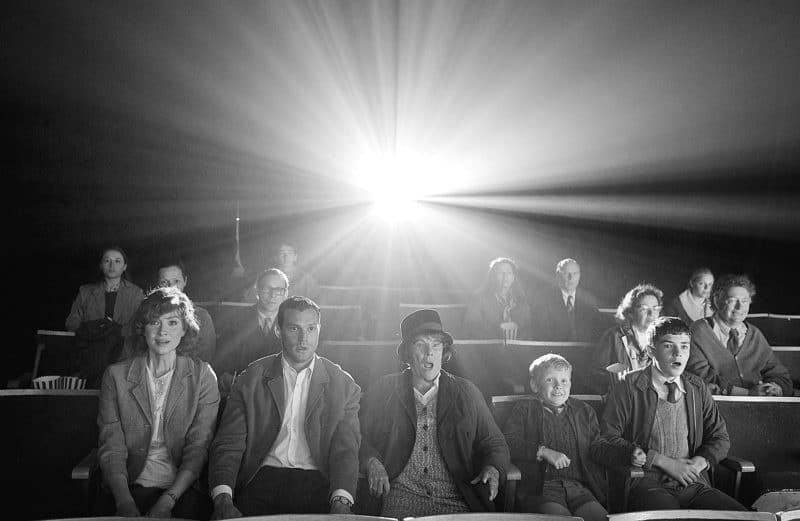Movie attendances bounced back in 2022 as quantity far exceeded quality. Only 20 exceeded the $1 million mark at the box office, with reboots dominating the most popular offerings.
Top Gun: Maverick was well out in front, followed by Thor: Love and Thunder, with the latest in the Dr Strange, Minions and Jurassic Park franchises making up the top five.
The inventive biopic Elvis, which had the advantage of originality, was sixth and headed off The Batman, another deep, dark dive into the background of the comic-book superhero.
In my top 10, Kenneth Branagh’s autobiographical Belfast was 20th at the box office, reflecting his pulling power. His formulaic Death on the Nile ranked 28th at the box office.
Festivals made a strong comeback with the Scandinavian, French and Italian events doing an excellent promotion job. The World War II-set Farewell, Mr Haffmann, from France, made my top 10.
The NZ International Film Festival showcased two more of my top 10: the Korean thriller Decision to Leave, and a French adaptation of Balzac’s Restoration epic Lost Illusions.
Most of the festival’s Cannes lineup didn’t rate a mainstream release. As the screenings and venues had been cut back, this meant that many acclaimed features had little exposure.
The remainder of my top 10:
The Eyes of Tammy Faye, with Jessica Chastain’s Oscar-winning performance as the tormented televangelist;
Benediction, a portrait of the poet Siegfried Sassoon by Terence Davies;
Drive My Car, a riveting Japanese study of acting and grievance;
Parallel Mothers, another brilliant piece of storytelling from Spanish director Pablo Almadovar; and
A Hero, from Iran’s master director Asghar Farhadi.
My final choice didn’t get to a cinema at all: All Quiet on the Western Front, filmed in German, was available only on Netflix and equal in many ways to 1917, the Bafta-winner for 2019.
The Kiwi industry produced a handful of releases, most of them modest in content and appeal. But this was not the case with the Māori-themed Muru and Whina, both of which deservedly captured respectable audience support at 23rd and 25th, respectively.
Three documentaries, on Dame Valerie Adams, the Gloriavale cult, and David Farrier’s Mister Organ, were still attracting audiences at year’s end.
The major Hollywood studios changed tack during the year on how they treated their streaming services and maximising returns from their box office and subscriber audiences.
The cinema industry, and many of the directors and stars, insisted that movies continue to have big screen releases before becoming home entertainment.
Even Netflix and Amazon Prime started to realise this as they had pulled back their budgets and looked to traditional sources of revenue.
But this didn’t stop many high-quality releases being offered exclusively to home viewers. Some that easily fitted this category were Sally Potter’s The Roads Not Taken, about dementia; Steven Soderberg’s KIMI and No Sudden Move, about surveillance and the motor industry, respectively; Adam Sandler as a basketball scout in Hustle; and Andrew Dominick’s Blonde, loosely based on the life of Marilyn Monroe.
CLIPS
The Wonder
(Netflix)
Irish novelist Emma Donoghue’s claustrophobic thriller Room, about a detained mother and boy, was a movie hit in 2015. Her subsequent novel was set in 1862 about the “fasting girls” phenomena during Ireland’s Great Famine. An 11-year-old refuses food while in a form of religious “rapture” that makes her an object of pilgrims. Chilean director Sebastian Lelio (Gloria) brings an atmospheric mix of awe and scepticism to this adaptation, with Donoghue and Alice Birch (Succession, Normal People) also working on the script. Much is due to the casting of Florence Pugh (Don’t Worry Darling) as a British nurse, hired by local villagers to monitor the girl (Kila Lord Cassidy), who says she lives “on manna from heaven”. Pugh ignores her instructions and tries to break through the girl’s trauma-induced state. In this, she is assisted by a journalist (Tom Burke), whose kin have died in the famine and who wants to turn the story into one where the “wonder in every Irish child” is saved from starvation.
Rating: Mature audiences. 109 minutes.
My Policeman
(Amazon Studios)
Harry Styles proves his switch from pop singer to actor was no fluke in Don’t Worry Darling. He plays a young policeman in 1950s Brighton, the English seaside resort, who with his girlfriend (Emma Corrin) forms a three-way friendship with a museum curator (David Dawson). Their lives jump forward to the 1990s as the now retired couple take their frail and stroke-ridden friend into their home. In the 1950s, they enjoyed going to art galleries, discussing serious literature, and having fun. But we learn, in the 1990s, that the men’s relationship contained deeper secrets and these emerge as the lies they told each other and themselves are exposed. Based on the novel by Bethan Roberts and directed by Michael Grandage (Genius).
Rating: R13. 114 minutes
The Lost King
(Transmission)
The British film industry has an excellent sideline in adding quirky footnotes to history such as the amateur archaeologist who discovered the Sutton Hoo treasures (The Dig), the inexperienced golfer who entered a major tournament (The Open), and the thief who took a famous painting (The Duke). Now comes the housewife-historian Philippa Langley, who fought against the doubters and academic bureaucrats to resurrect, literally and figuratively, the legitimacy of King Richard II, the last of the Plantagenet monarchs. Specifically, she locates his remains buried in a Leicester church that has become a car park for social workers. Sally Hawkins would not be my ideal for the key role, but she drives the story along, dragging a reluctant husband (Steve Coogan in an uncharacteristic and understated performance) and others who can fulfil her mission. They include her imaginary friend “Richard III” (Harry Lloyd), whom she has seen on the stage in Shakespeare’s heavily distorted Tudor version of history. More liberties are taken with the depiction of the university’s top brass but these pale beside Hawkins’s dogged pursuit of her dream.
Rating: TBA. 108 minutes. To be released on Boxing Day.

Reader Interactions